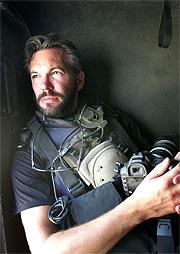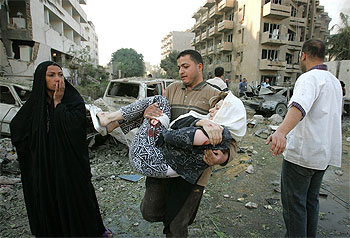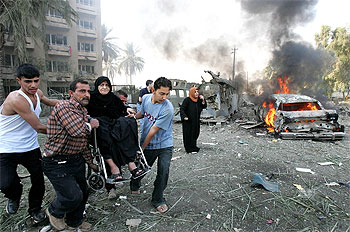 |
 | ||||||||||
Amman Airport,
Christmas Eve 2005 |
 |
|||||||||
|
The airline supervisor peered at me over the counter as I piled the scales high with over 100 kilos of baggage. If the airline charged me for the excess I would be in deep trouble. She gave me a friendly smile and waved it all through at no charge. I sagged with relief and walked over to the immigration booth and a step nearer to home.
The U.S. State Department had organized visits throughout Iraq for journalists to witness the "democratic process" in action. Predictably everyone had discussed where most problems were likely to occur and signed up for those locations. Fallujah, always a popular dateline, was fully booked; Ramadi, the next most obvious choice, would be crowded too. I decided to go somewhere I had never been before.
Tal Afar was perfect, topical and in the middle of nowhere. One issue involved with covering this remote story became apparent when our small group began traveling north from Baghdad. We arrived at the airport and proceeded to wait nine hours for an onward flight to Mosul where, after a short delay, we continued by helicopter to Tal Afar.
A few hours' sleep later we were up and heading for the polls. Of course, not all was to go to plan: firstly, for several hours I was denied permission to shoot pictures inside the polling station and then, once all was over and done, it took 52 hours to get back to Baghdad, which is only 418 kms (260 miles) to the southeast. Flight after flight was cancelled or delayed due to poor weather or mechanical problems. After more that two days and a flight out of Iraq to Kuwait, then back to Baghdad, the job was over.
On Nov. 18, two vehicles attempted to break through the security perimeter of the Al-Hamra Hotel in Baghdad to kill us.
First, there was a minibus with 400 lbs. of explosives on board. It pulled up alongside the wall of the hotel and exploded. It was 8:15 a.m. and I awoke as the windows and doors of the hotel exploded inwards. Seconds later another huge detonation, this time 1,000 lbs., shook the building, sending more glass, dust and smoke into my room. This shock wave brought down the suspended ceilings and turned what was left of the windows into more deadly shrapnel. That explosion was the loudest noise I had ever experienced and the shock wave shook every bone in my body; it shook my teeth and seemed almost paralyzing. By now I was on the floor beside my bed attempting to get under it, though failing.
Still on the floor, I started pulling on my jeans and boots as gunfire erupted around the compound. I crawled into the bathroom, the only room with no windows and therefore the safest; somehow I managed to get my contact lenses in. My cameras and body armour were already laid out so I grabbed them and after a few stunned moments of shock I crunched around my room over the shattered glass and wrecked doors and then squirmed past the wreckage into the hallway.
The hallway was blocked by twisted sheets of metal and wiring from the ceiling; every door from every room, all blown from their hinges, cluttered my route out of the building. Water dripped from the floor above and both the floor and walls were smeared with fresh, bright blood.
My cell phone rang; it was a friend from another building in the complex checking to see if I had survived.
Once down in the lobby I saw the wall of the hotel had been partially destroyed. Through the gap I could see burning cars, men running with guns and could hear screaming. I scrambled through the hole and jumped down into the rubble, twisting both of my ankles on impact. As I hobbled towards the other survivors I realized my arms and fingers were cut and a big patch of skin was missing from my inner arm.
Still dazed, I began shooting pictures. Normally the bomb attacks happen some distance away and we arrive on the scene to be greeted by the blast-shocked victims wandering around looking for their loved ones and surveying what is left of their homes. This time it was very different - we were the victims, the attack had been against us and we had survived due to a tiny margin of error on the part of the bombers.
The first blast had made a hole in the perimeter for a larger truck to enter and get close enough to our hotel to collapse it. Fortunately it got stuck in the crater made by the first bomb and so the driver detonated there. Had he achieved his aim the building I slept in would be nothing but rubble.
Eight people had died (this would later reach 15) and more than 40 wounded. Several houses had collapsed entirely, and locals were trapped beneath the debris.
What remained of the suicide bombers was a severed foot laying near the entrance to the hotel and part of a head floating in the pool.
It was my 360th day in Iraq.
© Jason P. Howe
Dispatches are brought to you by Canon. Send Canon a message of thanks. |
||||||||||
Back to January 2006 Contents
|
|



